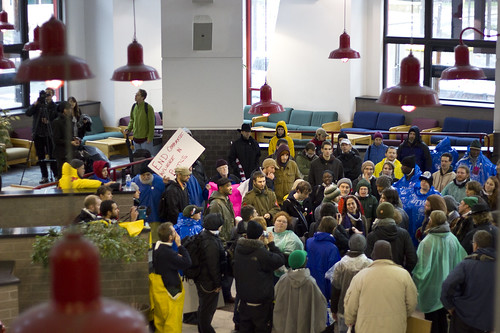
Occupy protesters targeted students when a political event on campus was canceled.
As wet snow lined Philadelphia grounds Saturday, Oct. 29, Occupy Philadelphia protestors marched to Main Campus to sit-in at an event featuring former President Bill Clinton. But when their message couldn’t reach politicians, they turned their attention to students.
The rally, scheduled for 2 p.m., was intended to support Mayor Michael Nutter’s re-election campaign. Clinton reportedly could not make it to Philadelphia due to weather, which left Occupy supporters to seek another public venue.
The protesters, who intended to silently sit in at the rally, went to Mitten Hall, unaware of the cancellation. They then traveled to the Student Center, only to find the entrance blocked off by police officers. While the group then set its sights on Paley Library, they were later told they had received clearance to enter the Student Center.
“I think we were just going to show our numbers and let our presence be felt,” Justin Murphy, a doctoral candidate for political science, said. “The point of the march was to just symbolize how we are all silenced by the corporate domination of American politics.”
Taking to the atrium, the protestors chanted in support of the movement and against student loan debt.
After the short meeting, some protestors, including student-occupiers, took to the dining area on the north side of the first level in an attempt to garner more student participation.
The small group of protestors began speaking before the whole dining area, before visiting individual tables to speak to students about the movement.
“It’s very natural if the one direct action we planned was thwarted, to turn our attention and energy to everyone around and us,” Murphy said. “Historically, students have also been a pretty radical force for political change.”
Freshman mathematics major Cameran Allavi said Murphy’s visit to his table educated him and his friends on the movement.
“It opened all of our eyes, we didn’t realize that they’re not just blindly protesting the man. That they actually have real causes,” Allavi said. “I wouldn’t be against it now. It seems pretty interesting.”
Adam Shumski, a freshman jazz performance major, agreed with Allavi’s sentiment.
“I was really confused [with] the whole 99 percent thing and the 1 percent thing. Even the guy explained to us that there are a lot of [causes in the movement],” Shumski said. “It’s not just one thing. I didn’t get that from them yelling, but once they broke up into groups and [Murphy] came over and he explained it to us in an intelligent manner, it was cool.”
Murphy said most students are usually skeptical and cynical when he first approaches them.
“You can only hold up that front for so long, until you actually feel…you begin to share or at least sympathize with the sense of urgency that’s motivating the person that’s speaking to you,” Murphy said. “We have a long battle ahead of us against the attitudes of skepticism and cynicism. You win in small steps, I think, of just infecting people with spirit of public protest.”
It wasn’t the first time Occupy supporters demonstrated on Main Campus to garner support. On Oct. 21, a walkout and rally at the Bell Tower was held before students marched to City Hall, the site of Occupy Philadelphia’s encampment.
But Saturday also highlighted the idea of acute weather forces and cold temperatures impeding the Occupy movement.
“Our overnight numbers as the winter progresses will probably shrink,” Julia Alford-Fowler, a doctoral candidate for music composition, said. “People need to stay healthy and will rotate out, so some people will stay there and hold a space. But I think people committed to the movement will find a way and stick it out.”
Alford-Fowler said the hardest thing, in terms of severe weather, is sleeping outside. She added that protesters are beginning to “weatherize” the camp by doing things such as raising tents.
While Alford-Fowler and Murphy agreed that weather may prove to an opposing force, they said the Occupy movement is no longer just physical.
“The occupations began as physical sites and they will continue to be physical sites,” Murphy said. “[Now,] the occupation exists over and above the physical sites. It’s in our heads, it’s out there, it’s now in the air.”
Angelo Fichera can be reached at afichera@temple.edu.



Great reporting, Angelo. I’ve been talking to the major press and telling them for weeks now to go talk to individuals to find out that the movement may be non-political, but the individuals and their concerns are not. I’m glad to see someone took the time to figure that out.